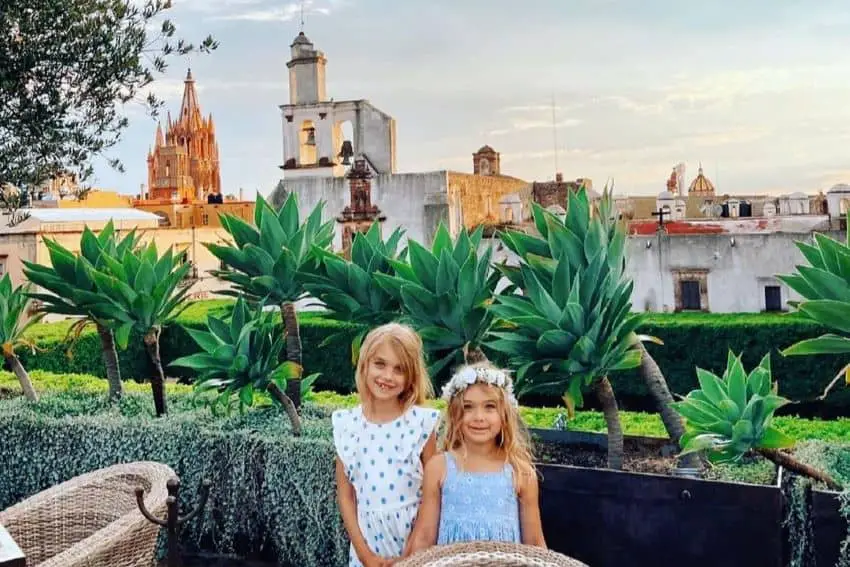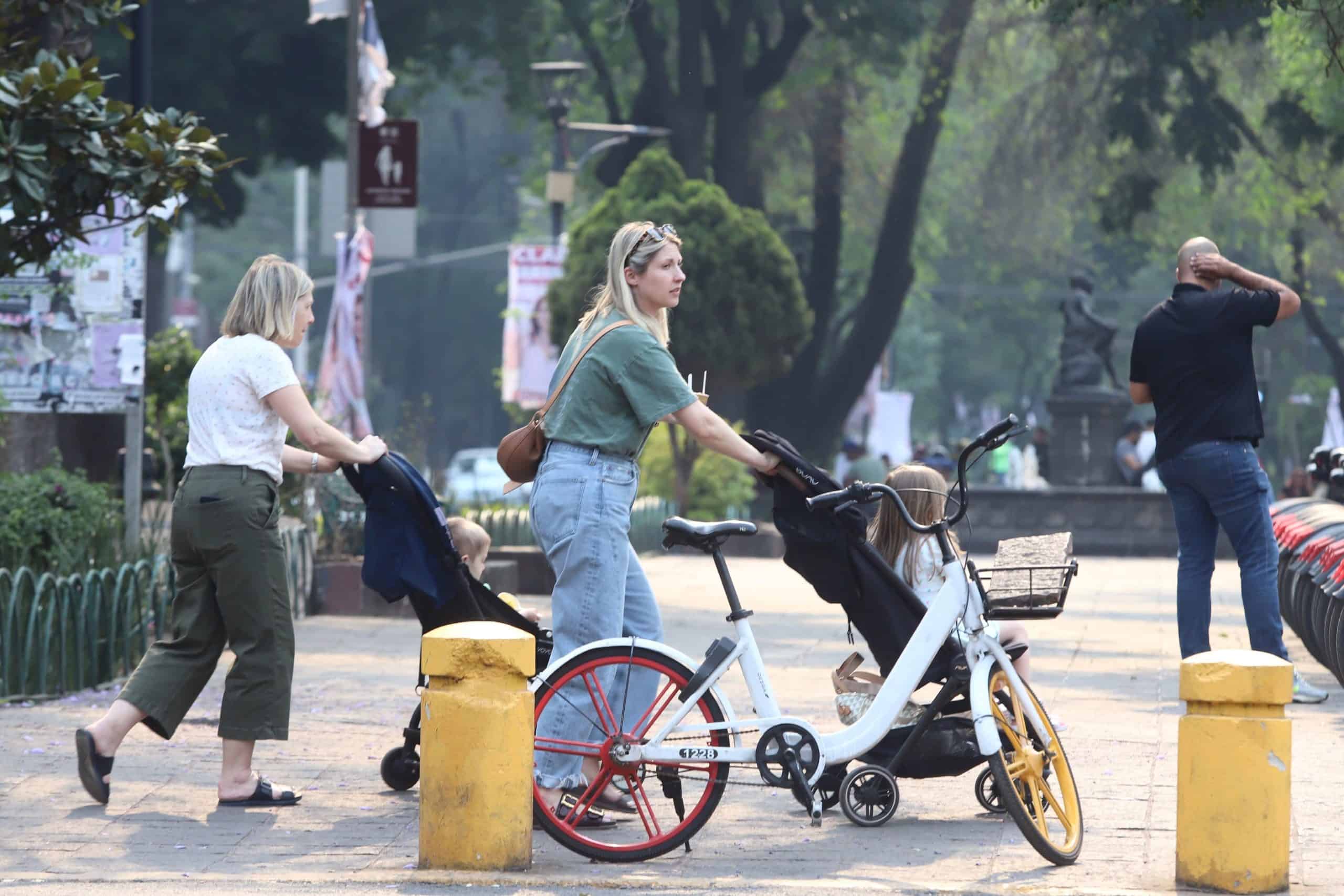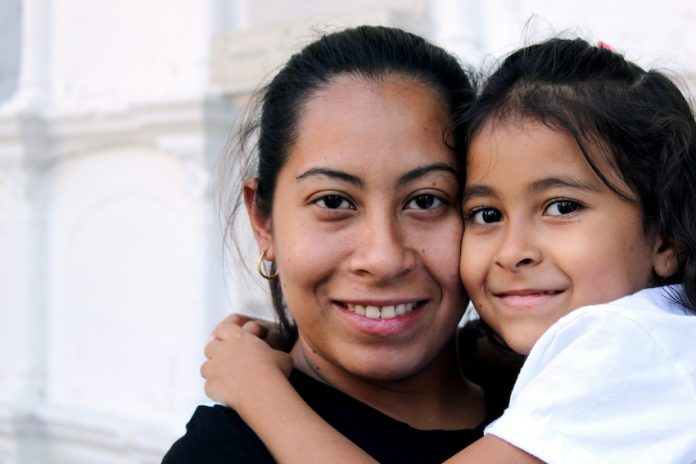Up until recently, motherhood and moving abroad have been very idealized. But these are very complex issues with their own nuances that become even more complex when they happen at the same time. Motherhood abroad — and motherhood as an expat in Mexico — tends to be more solitary, with less help from family and friends. Even in countries where maternity leave conditions are good, immigrant mothers feel lonely because they can’t share their concerns about motherhood as they would if they were home.
The experience of motherhood away from your place of origin can lead to lots of questions, from the most practical issues — how do health care and the school system work? — to more complex ones: What does it mean that your child will grow up far from your family and your country of origin? Will she be very different from you? Will he speak your language? How will you transmit your culture?

Raising immigrant kids in Mexico
For Ann, a mother of two living in San Miguel de Allende, “the hardest thing about it is not having extended family around. When we first moved here in 2012, my mom came too and she lived here for our first three years. And it was great, my kids could have sleepovers at grandma’s house! We were very sad when she decided to move back. My kids don’t get to see their cousins, their aunts and uncles very often, and that’s a real loss. Probably the biggest downside to all of this is missing out on having stronger relationships with their extended family.”
Sarah is from Germany and has three children between two and seven years of age. For her, some differences with her home country have been hard to deal with: “I see several cultural differences, especially related to those between men and women, that sometimes I find it hard to accept. Above all, I feel it is unfair to expect the mother to always be with her children, while if the father is there, it is seen as something extraordinary. If the mom takes care of the housework, it is her duty, and if the dad does it, he is ‘helping the mom.’ All of that seems very strange to me.”
Katie is a mother who moved to San Miguel 10 years ago with her children.“The benefit of being here of course is having my children be bilingual and bicultural,” she says. “It is just amazing.”
Among the concerns of women facing motherhood outside their country of origin, they worry that they will not be able to share the experience with family and friends in their homeland and that their children will not have a close relationship with their grandparents, aunts, uncles or cousins. But culture is also an issue that causes some ambivalence. The concern that your children do not identify with your culture or share your identity, is recurrent among women who decide to become mothers in another country.

Not one situation will be perfect. Motherhood has challenges anywhere, and new cultures have their benefits. For Sarah, Mexico is a place where “children are always welcome,” in contrast to Germany, where “it seems like nobody likes noise and kids.” On the other hand, “Germany has a lot of playgrounds everywhere. It is hard to find a playground in Mexico.”
Is there a best time to move to Mexico with children?
“My biggest advice to families considering a move like this is to come as early as possible into your kid’s lives,” Ann says. “My kids were four and six when we moved. They’re now 16 and 18. So they’ve basically grown up here and it was a pretty painless transition from my kids when they were that young.”
Language and cultural adaptation are common obstacles for expatriate women. Perhaps for this reason, in many cases, the first thing women do is to start studying the language of the place where they have arrived. This opens the doors to interact and gives you the independence to do daily business, make friends and find a job.
Ann shares that her children “both soaked up the language and the culture so easily, but it was even a bit easier for the four-year-old than the six-year-old. At that age, you’re not embarrassed about making a mistake. You just talk, and everybody learns to read at the same time. I have watched some families come with older kids and learning the language is a lot harder for them, so fitting in and making friends becomes more challenging.”

If you can, get help
Mothers tend to believe that we can do it all on our own. But being a working mom without help is very challenging. In Mexico, you can hire a nanny to help you out with children or someone to help you with domestic chores. Either way, try to make your own experience easier — no one needs a tired super-mommy.
Sarah shares her experience with this in Mexico: “What I like the most is the possibility of having a nanny to help me with the housework and to take care of my children when I can’t. I am from Germany and it is almost impossible to have a nanny there. This way I can work and exercise by myself and enjoy them and be with them instead of cooking, cleaning and washing when they are home. It gives me more freedom and more time for myself.”
Ann expands on this experience: “The economic benefits are important. It is very nice to be able to afford full-time help, private schools are more affordable, also the extracurricular lessons, so they get to try many sports, musical instruments, etc.”
Finding a school
Schools can be a perfect place for you to meet other parents who are in the same situation as you or local parents willing to show you how things are done in your new home. But finding a school that fits you and your family is not easy, even when you are in the same country that you were born in! And in Mexico, it can get especially hard if you decide to move to a small town.

“We came to San Miguel and the educational opportunities were more limited. Had we moved to Mexico City or Guadalajara, we would have had a range of great schools to choose from. Here there’s not a lot of options, but we happen to move here the exact year that the Academia Internacional opened and we sort of walked into this instant community of Mexican, American and other expat parents trying to build this new good school together. And so, being part of something and working towards a common goal was a great way to get integrated here.”
On the other hand, Ann shares the relief she has felt about the culture at school in Mexico: “For the whole time we’ve been here I’ve never had to worry about things like school shootings. Kids my son’s age in the U.S. have all done active shooter drills to prepare for the next school shooting that could be at their school. My kids have never experienced that here.
Reflecting about the extracurriculars and sports on offer Katie shares, “I really have problems with some of the things that aren’t here in San Miguel. There’s not organized sports like in the U.S. So there’s soccer and there’s some dance classes, but not all these other things in the U.S. that aren’t here. But we feel like the benefits of having our kids be bicultural and bilingual far outweigh that.”
Mexican society can be considered a little conservative, and sometimes finding resources for children with special educational needs or LGBTQ+ children can be a challenge. If you’ve found resources, leave them in the comments!
Use technology
Keeping in touch with family and friends and connecting with other expats, especially if they are also mothers, can be very helpful. When you become a mother, you find yourself with a new vital need to surround yourself with other mothers. Especially if your mother lives far away, you will feel a desire to share, to ask questions, to talk to women who are also going through motherhood with all its ups and downs. Thanks to the Internet and social networking it is very easy to find other mothers in the country where you live, and to feel understood and accompanied.

“What I miss the most is being with my parents. The support and love they give me and my children is unmatched. Here in Mexico, there are several moms from other places and there are many support and friendship groups, for which I am very grateful. But it is not the same, obviously. Maybe it has less to do with the culture I come from and the country I live in and more with the importance of my mom in my own experience of having children. But since I have children, I miss my parents more than before,” Sarah shares.
Being able to listen and feel that what you are living has been lived and is lived every day by other women will help you feel less alone. To feel part of the universal cycle of life. If where you live, you don’t find other women to share your doubts, joys or fears with, social networking groups may help you create your own circle of support.
Katie shares a little about her experience being a part of a community in WhatsApp groups for moms. “I don’t know of many support groups, which is sad because I’m a therapist, but I know that there are mom chats. I’m in a chat with more than 50 moms, and we throw back questions and get together sometimes.”
Embrace cultural diversity
The world is big and diverse, so showing your child that life does not revolve solely around what he is used to can be a game changer for his life. Ann shares, “It’s such a beautiful way to be in the world and move through it, being able to adapt to more than one culture and being comfortable. And that opens you up to be comfortable anywhere in the world. So, honestly, I think moving here and giving them that gift is the best parenting decision we ever made.”
Camila Sánchez Bolaño is a journalist, feminist, bookseller, lecturer, and cultural promoter and is Editor in Chief of Newsweek en Español magazine.
